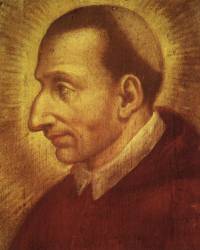
St Charles Borromeo (Italian: Carlo Borromeo, Latin: Carolus Borromeus, 1538–1584) was a cardinal who was archbishop of Milan from 1564 to 1584. Among the great reformers of the troubled sixteenth century, Borromeo, with St. Ignatius of Loyola, St. Philip Neri, and others, led the movement to combat the inroads of the Protestant Reformation. He was a leading figure during the Counter-Reformation and was responsible for significant reforms in the Catholic Church, including the founding of seminaries for the education of priests. He is honoured as a saint in the Catholic Church and his feast day is 4 November.
St Charles was a descendant of nobility: the family of Borromeo was one of the most ancient and wealthy in Lombardy, made famous by several notable men, both in the church and state.[1] The aristocratic Borromeo family’s coat of arms included the Borromean rings, sometimes taken to symbolize the Holy Trinity. Charles’ father Gilbert was Count of Arona; his mother Margaret was a member of the Milan branch of the House of Medici. The third son in a family of six children, he was born in the castle of Arona on Lake Maggiore, thirty-six miles from Milan, on 2 October 1538.[2]
Borromeo received the tonsure when he was about twelve years old. At this time his paternal uncle, Julius Caesar Borromeo, turned over to him the income from the rich Benedictine abbey of Sts. Gratinian and Felin, one of the ancient perquisites of this noble family. In spite of his youth, St Charles made plain to his father that all revenues from the abbey beyond what was required to prepare him for a career in the Church belonged to the poor and could not be applied to secular use. The young man attended the University of Pavia, where he applied himself to the study of civil and canon law.
Due to a slight impediment of speech, he was regarded as slow; yet his thoroughness and industry more than compensated for the handicap.[2] In 1554 his father died, and although he had an elder brother, Count Federico, he was requested by the family to take the management of their domestic affairs. After a time, he resumed his studies, and on 6 December 1559 he earned a doctorate in utroque iure (canon and civil law).


